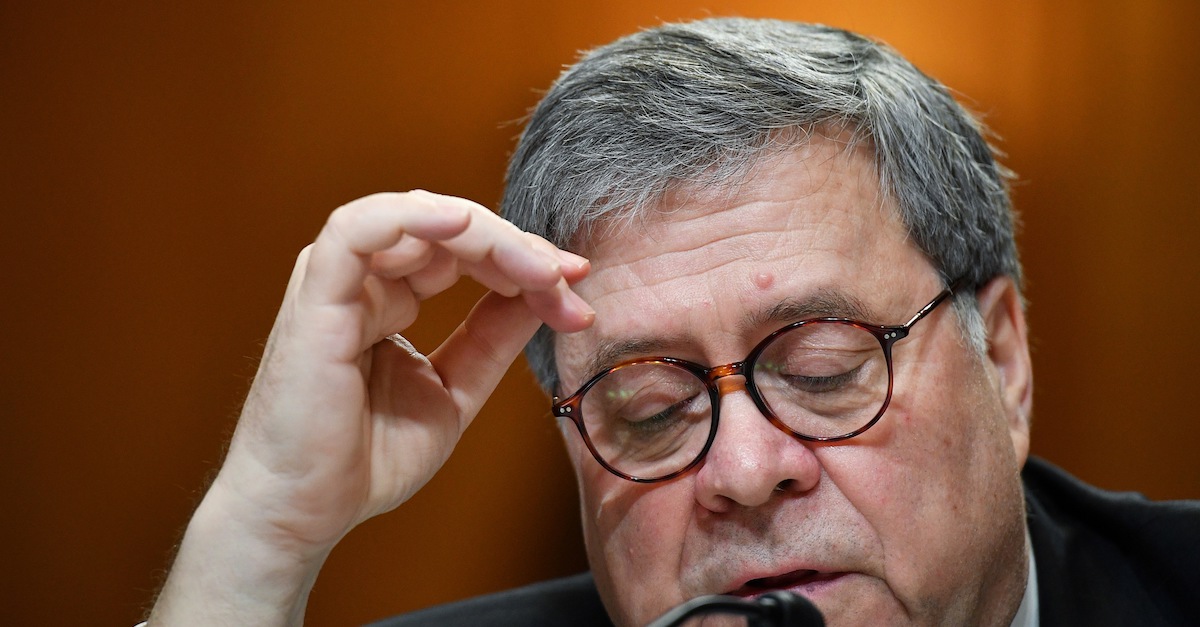
Is William Barr just trolling Democrats at this point? Speaker of the House Nancy Pelosi (D-Calif.) said the Attorney General of the United States acted more like the “Attorney General of Donald Trump” on Wednesday by resurrecting a long-debunked conspiracy theory about “unauthorized spying” on the Trump campaign under Barack Obama‘s watch. She’s not wrong about that.
Barr’s reputation preceded him when President Trump nominated him to replace acting Attorney General Matthew Whitaker as actual Attorney General. We are talking about a career Department of Justice official who has, putting it mildly, been around the block before. In fact, this is the second time he’s been the Attorney General (the first time was during the George H.W. Bush years). We are also talking about a person who, while a private citizen in June 2018, submitted his “unsolicited” thoughts on Special Counsel Robert Mueller‘s ongoing obstruction investigation to say that the “specific obstruction-of-justice theory” being talked about was “fatally misconceived.” How did that turn out? He was quickly invited to lunch, Jeff Sessions “resigned” months later, the aforementioned Whitaker replaced Sessions, and now Barr is actively working on redacting Mueller’s Russia report.
All of this is to say that the origins of AG Barr 2.0 are reason enough for Democrats to assume that he is out to protect the president, and reason enough for them to assume he’s orchestrating a “cover-up” — even if he’s legally justified in the redacting the document. While some of the criticism lawmakers have hurled Barr’s way has certainly been half-baked, by saying what he did today Barr played right into the suspicion.
Barr testified before lawmakers on Wednesday and said that he thinks “there was spying” on the Trump campaign. He then defined spying as “unauthorized surveillance.” As Law&Crime noted before, this was particularly jarring because President Trump previously claimed, without evidence, that the Obama administration wiretapped Trump Tower during the 2016 campaign. Although the Department of Justice Barr now runs shot that down in 2017 by saying there was no evidence to support this, Barr went back to this well.
“I think spying on a political campaign is a big deal,” he said. “I am not suggesting that those rules were violated, but I think it’s important to look at them.”
Barr went on to admit he had “no specific evidence that I can cite right now,” but added that he has “concerns about various aspects of it.”
The thing that’s so silly about this is that Barr was seemingly miffed about the way that the media and Democratic lawmakers responded to his four-page letter detailing Mueller’s “principal conclusions.” Barr said: He received the Mueller report; Mueller had no more indictments; Mueller did not allege conspiracy between President Donald Trump/Trump campaign and the Russian government; and Mueller didn’t exonerate Trump of obstruction of justice but didn’t allege it either. Barr then said he had determined that the evidence of obstruction was “not sufficient.” In saying this, he only included half-quotes from Mueller’s yet to be seen 400-page report.
After the backlash, Barr decided to tell lawmakers that he thought it went without saying that this was not an “exhaustive” account of Mueller’s investigation, emphasizing that his letter was clear and precise on that point.
“As my letter made clear, my notification to Congress and the public provided, pending release of the report, a summary of its ‘principal conclusions’–that is, its bottom line,” he said.
What Barr said today was decidedly not precise, but was decidedly troubling. As Law&Crime founder Dan Abrams noted earlier on his SiriusXM radio show, words have meaning and these meanings matter — especially in legal context — and Barr’s attempted walk-back didn’t help.
“What the heck are you doing using the word spying then?” Abrams asked. “For a lawyer — for those of us who are lawyers, words matter, you have to be precise in your words, and then he goes back to instead of calling it surveillance, calling it spying again.”
“Unauthorized surveillance” means “illegal.” Contrast that with FISA-authorized surveillance. Although FISA warrants are issued in secret proceedings and are controversial for that very reason, they must still be “authorized” by a judge on the United States Foreign Intelligence Surveillance Court.
What possessed Barr to throw the words “unauthorized” and “spying” around so loosely, and how can he possibly expect to be seen as a trustworthy editor of Mueller’s findings?
[Image via Mandel Ngan/AFP/Getty Images]
This is an opinion piece. The views expressed in this article are those of just the author.